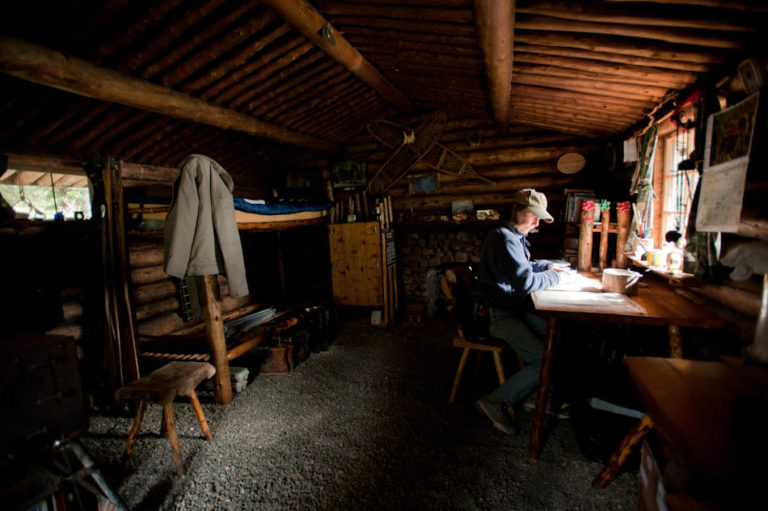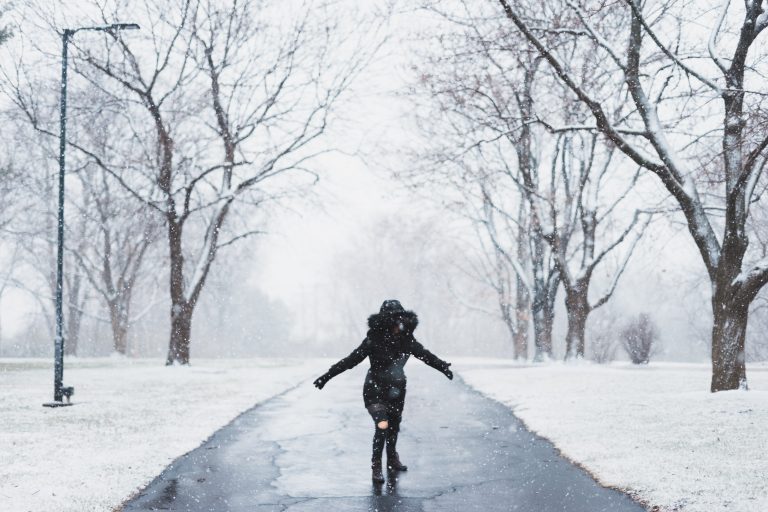
Image by Kent Miller/Flickr, Attribution-NoDerivs.
Notes from a Week in the Winter Woods
I’ve been on retreat at a cabin in the woods since last Monday — a silent, solitary retreat. As my time here got underway, I took a few notes each day — a sort of mini-journal — and got the idea of stringing them together.
Monday, Jan. 11, 2016
Arrived in mid-afternoon at my rented cabin in the snow-covered Wisconsin countryside. Went inside, lit a fire, and unpacked the car, quickly, motivated by the sub-zero wind chill. Outside, acres of bright fields and dark woods. Inside, just me. Plus enough clothing, food, and books for a week of silence and solitude.
Last night, someone asked if I liked being alone. “It depends,” I said. “Sometimes I’m my best friend. Sometimes I’m my worst enemy. We’ll see who shows up.”
It’s 9:00 p.m., an hour before Quaker midnight, but I’m going to turn in anyway. I’m drowsy and at peace. The fire I’ve been staring into seems to have burned away the worries that tagged along with me.
Tuesday, Jan. 12, 2016

Woke up about 5:00 a.m. and lay awake for another hour in the dark, watching my worries rise phoenix-like from the ashes and flap around to get my attention.
“Welcome and entertain them all!” says Rumi in The Guest House.
“Be grateful for whoever comes,
because each has been sent
as a guide from beyond.”
Guess I need to have a chat with the “beyond.” Looks like he/she/it didn’t get the memo that I came here for some peace.
Now, a few hours later, I’m feeling that peace again. It came from a breakfast of bacon, eggs, and toast, all ready simultaneously despite the fact that I’m a certified kitchen klutz. It came as well from looking out on the snowfields, brilliant under the rising sun — but beautifully etched with the shadows of trees and stubble poking up through the snow.
The “beyond” was right: peace comes from embracing the interplay of shadow and light (and a good breakfast doesn’t hurt). After breakfast, I read the January 12 entry in A Year With Thomas Merton, a collection of daily meditations:
“It seems to me that I have greater peace… when I am not ‘trying to be contemplative,’ or trying to be anything special, but simply orienting my life fully and completely towards what seems to be required of a man like me at a time like this.”
Simple and true, but so easily lost in Type-A spiritual striving! What was required of me this morning was simply to make breakfast despite my well-documented ineptitude. The deal is to do whatever is needful and within reach, no matter how ordinary it is or whether I’m likely to do it well.
This afternoon, what I needed was a hike, though the wind chill was six below. I’m no Ernest Shackleton, but I learned long ago that winter will drive you crazy until you get out into it — and I mean “winter” both literally and metaphorically. “In the middle of winter,” said Camus, “I at last discovered that there was in me an invincible summer.”
I didn’t discover summer on my hike. But the sun blazed bright on the frozen prairie, warming my face. And high in the cobalt blue sky, a hawk made lazy circles as I’ve seem them do in July. For January, that’s close enough to summer for me!
Wednesday, Jan. 13, 2016

I slept poorly last night, and I know why. An hour before bedtime, I binge-ate a box of Jujyfruits while reading a book about spiritual discipline. The book made a few good points but was not well written, and I scarfed down the Jujyfruits as a stimulus to stick with it. My bad. But clear evidence that I could use some discipline!
I feel better now because the oatmeal I made for breakfast — on my second try — was healing. Pure comfort food. On the first try, I got the ratio of oatmeal to water wrong and left it on the burner too long. The pan looks like a grotesque avant garde sculpture of metal and grain: “Agrarian Culture Defeated by Machine.” Again, my bad. But my kitchen klutz credentials have been reinstated.
I guess my theme today is “Screw-ups in Solitude.” In solitude, my bads make me grin. If I committed them in front of others, I’d be embarrassed or angry with myself. Self-acceptance is easier when no one is around.
The Taoist master Chuang Tzu tells about a man crossing a river when an empty skiff slams into his. The man does not become angry, as he would if there was a boatman in the other skiff. So, says Chuang Tzu:
“Empty your own boat as you cross the river of the world.”
In solitude, I can empty my boat. Can I do it when I’m not alone? Maybe.
“Solitude does not necessarily mean living apart from others; rather, it means never living apart from one’s self. It is not about the absence of other people — it is about being fully present to ourselves, whether or not we are with others.”
That quote comes from a book I wrote, so I should probably give it a try!
Thursday, Jan. 14, 2016

Woke up at 2:00 a.m. and found myself regretting some things I got wrong over the past 77 years. Wished I had been kinder, or braver, or less self-centered than I was, and had a hard time remembering the things I got right.
Knowing that the 2:00 a.m. mind is almost always deranged, I got up at 4:00 a.m., dressed, made some coffee, stood out in the dark and cold for a bit, and saw Venus gleaming low in the southeast. The goddess of love: that helped!
Then I read the January 14th entry in A Year With Thomas Merton. Once again, my old friend had a word I need to hear, as he reflected on the complex mix of rights and wrongs in his own life:
I am thrown into contradiction: to realize it is mercy, to accept it is love, and to help others do the same is compassion.
Merton goes on to say that the contradictions in our lives are engines of creativity. It’s true. If we got everything right or everything wrong, there’d be none of the divine discontent or the sense of possibility that drives us to grow. What we get wrong makes us reach for something better. What we get right gives us hope that the “better” might be within reach.
Now I feel ready to step into the day animated by the counsel of Florida Scott-Maxwell:
“You need only claim the events of your life to make yourself yours. When you truly possess all you have been and done… you are fierce with reality.”
I fully intend to get fierce and real today. But before I do that, I’m going to take a nap!
Friday, Jan. 15, 2016

This morning, for no apparent reason, I woke up with a grin, another one of those “guests” Rumi spoke about, “sent as a guide from beyond.” But this time the guest is a welcome lightness, a sense of impending laughter.
Most of my heroes are folks who are no strangers to laughter. Grandpa Palmer comes to mind. The man was proof-positive of William James’s claim that “common sense and a sense of humor are the same thing, moving at different speeds.” Grandpa taught me to drive when I was 14. First time out, I made a dumb, dangerous move on a back-country Iowa road. When we came to a safe stop, Grandpa was ominously silent for a moment. Then he said, laconically, “If I’d of knowed you was gonna do that, I don’t believe I’d of asked you to drive.” He never said another word about my near-disaster, and for the past 60 years I’ve driven accident-free!
Merton was well known for his sense of humor, a quality not uncommon among monks. In The Sign of Jonas, a deeply moving journal of his early years in the monastery, there’s a line on page 37 that always makes me smile:
“I had a pious thought, but I am not going to write it down.”
And I love this claim, found in a Hindu epic called The Ramayana, as told by Aubrey Menen:
There are three things which are real: God, human folly, and laughter. The first two are beyond our comprehension, so we must do what we can with the third.
I’m sure I’ll experience all three today. The first is ever-available, if my heart is open. The second is guaranteed, since wherever I go, there I am. As for the third, I’ll do what I can with it. As Chesterton quipped:
“Angels can fly because they take themselves lightly.”
Saturday, Jan. 16, 2016

Today’s opening line in A Year With Thomas Merton, “You can make your life what you want” if you don’t “drive [yourself] on with illusory demands.” I don’t think it’s entirely true that I can make my life what I want. But it would help if I stopped making demands on myself that distort who I really am and what I’m really called to do.
After five days of silence and solitude, many of the demands that hung over me when I came out here have lightened or lifted. Since I’ve done little this week to meet those demands, the lesson seems clear: they were mostly the inventions of an agitated mind. Now that my mind has quieted, its “illusory demands” have vaporized, and I feel a deeper peace.
I remember a story my businessman dad told me about how he dealt with pressure. In his office, he had a desk with five drawers. He’d put today’s mail in the bottom drawer, after moving yesterday’s mail up to the next drawer, and so on. He’d open letters only after they had made it to the top drawer. By that time, he said, half the problems people wrote him about had taken care of themselves, and the other half were less demanding than if he’d read the letters the moment they arrived! As Black Elk said to the children in his tribe when he told a teaching story:
“Whether it happened that way, I do not know. But if you think about it, you will see that it is true.”
Of course, the curse called email did not exist in Dad’s day. Still, his story points the way: make five folders for my email, and use them as Dad said he used his desk drawers. In certain respects, you can make the life you want!
Sunday, Jan. 17, 2016

On this last full day of my retreat, I’m still meditating on the opening line of the January 13 entry in A Year With Thomas Merton:
“There is one thing I must do here at my woodshed hermitage… and that is to prepare for my death. But that means a preparation in gentleness…”
What a great leap — from death to gentleness! So different from Dylan Thomas’s famous advice:
“Do not go gentle into that good night…
Rage, rage against the dying of the light.”
When I was 35, raging seemed right. But at 77, it’s Thomas Merton, not Dylan Thomas, who speaks to me.
The prospect of death — heightened by winter’s dark and cold, by solitude, silence, and age — makes it clear that my calling is to be gentle with the many expressions of life, old and new, that must be handled with care if they are to survive and thrive.
Sometimes, of course, that means becoming fierce in confronting the enemies of gentleness. If that’s a contradiction, so be it! As Merton said in The Sign of Jonas:
“I find myself traveling toward my destiny in the belly of a paradox.”


Share your reflection